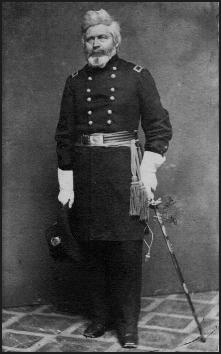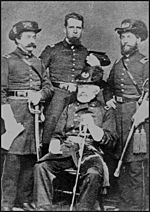Thomas J. McKean facts for kids
Quick facts for kids
Thomas Jefferson McKean
|
|
|---|---|

Thomas Jefferson McKean
|
|
| Born | August 21, 1810 Burlington, Pennsylvania |
| Died | April 19, 1870 (aged 59) Marion, Iowa |
| Place of burial |
Oak Shade Cemetery, Marion, Iowa
|
| Allegiance | United States of America Union |
| Service/ |
United States Army Union Army |
| Years of service | 1831–1834, 1837–1838, 1847–1848, 1861–1865 |
| Rank | |
| Unit | 4th U.S. Infantry 15th U.S. Infantry |
| Commands held | 6th Division, Army of the Tennessee |
| Battles/wars | Seminole Wars Mexican–American War American Civil War |
Thomas Jefferson McKean (born August 21, 1810 – died April 19, 1870) was an important American figure. He was an engineer, a soldier, a politician, and a farmer. He studied at West Point, a famous military school. McKean fought in the United States Army during the Seminole Wars and the Mexican–American War. Later, he became a general in the Union Army during the American Civil War.
Contents
Early Life and First Army Service
Thomas J. McKean was born in 1810 in Burlington, Pennsylvania. He joined the United States Military Academy at West Point in 1827. He graduated four years later, ranking 19th in his class of 33 cadets. On July 1, 1831, McKean became a brevet (temporary) second lieutenant in the 4th U.S. Infantry.
For the next three years, he served in the U.S. Army. He was often on garrison duty, which means guarding a military post. He was promoted to second lieutenant on September 15, 1833. McKean decided to leave the U.S. Army on March 31, 1834.
Engineer and War Service
After leaving the army in 1834, McKean started working as a civil engineer. This job involves designing and building things like roads and bridges. He then took part in the Seminole Wars from 1837 to 1838. During this time, he was an adjutant (an assistant to a commanding officer) for the 1st Pennsylvania Volunteers. He held the rank of first lieutenant.
McKean resigned again on March 31, 1838, and went back to being an engineer in Pennsylvania. In 1840, he moved to Marion in the Iowa Territory. In 1844, he helped write the rules for Iowa to become a state.
Fighting in the Mexican-American War
When the Mexican–American War started, McKean volunteered to serve again. He joined the 15th U.S. Infantry as a private on April 12, 1847. He was quickly promoted to sergeant major on May 10. He fought in the Battle of Churubusco on August 20, where he was wounded.
McKean was offered a temporary second lieutenant position in the 2nd U.S. Dragoons, but he turned it down. He was discharged from service on August 7, 1848, after the war ended. It was unusual for someone trained at West Point and who had been an officer to fight as an enlisted man. After the war, he returned to his life in Iowa, which had become a U.S. state in 1846.
American Civil War Service
When the American Civil War began in 1861, McKean supported the Union side. On June 1, he became a paymaster for the Union Army, which meant he was in charge of paying soldiers. On September 18, he led the cavalry (soldiers on horseback) for the Department of the Gulf.
McKean was briefly in charge of prisoner of war camps in Missouri. On November 21, he was appointed a brigadier general in the Union Army.
Leading Troops and Districts
From December 1861 to March 1862, McKean commanded troops at Jefferson City, Missouri. On April 10, he was given command of a division (a large group of soldiers) in the Army of the Tennessee. He fought in the Battle of Corinth in Mississippi on October 3–4. He continued to lead his division until December 9.
Throughout 1863, 1864, and until July 10, 1865, McKean commanded many different military districts. On March 13, he was given the temporary rank of major general for his service during the war. He officially left the volunteer service on August 24, 1865.
After the War
After the American Civil War ended in 1865, McKean went back home to Iowa. He was elected mayor of Marion that same year. He also started farming near the city until 1869. In 1868, he was a representative at the Republican convention in Chicago, Illinois.
In early 1870, McKean was offered a job as a pension agent (someone who helps distribute payments to veterans) for eastern Iowa, but he turned it down. He died in Marion, Iowa, in April 1870. He was buried in the city's Oak Shade Cemetery.
 | Bessie Coleman |
 | Spann Watson |
 | Jill E. Brown |
 | Sherman W. White |


